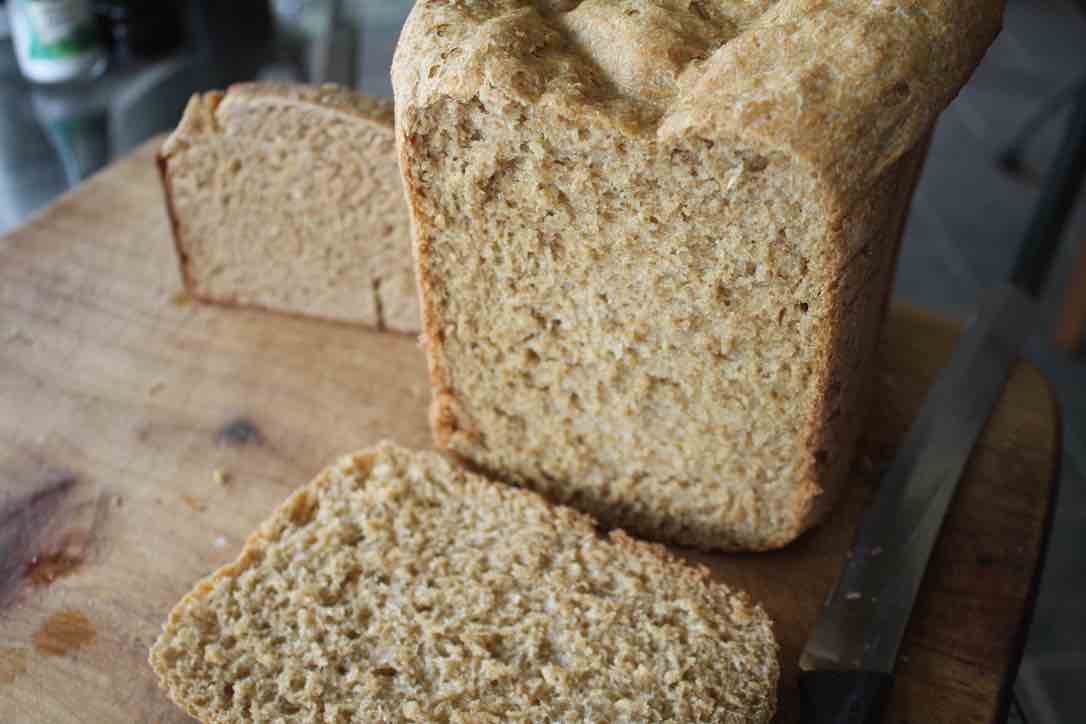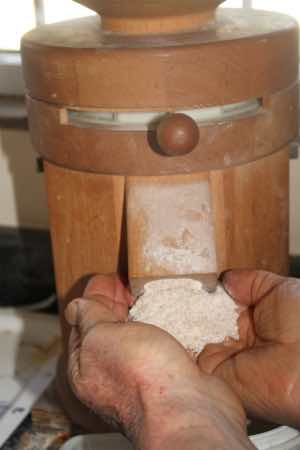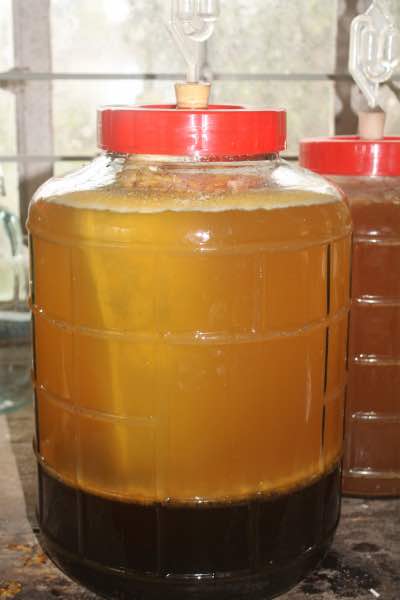- Homepage
- Our green kitchen
- Dough Has a Mind of Its Own
Dough has a mind of its own
Dough has a mind of its own so do not give up should you get a brick at the first attempt.
Once for a whole month, our bread would hardly rise and we still do not know why. It is not a reason to quit if your results are disappointing at first.
Baking your own bread is really only for those who have a mind for being precise; amongst which I do not number. However, I have been doing it daily for so long that within reason, I can tip the ingredients in, say a prayer and hope for the best; and then nine times out of ten get it right.
This page was last updated on the 9th March, 2025.

Does the very best bread in the whole world for less than half a dollar per loaf appeal to you? I am not exaggerating.
Then it is time to consider purchasing a bread machine; you can often pick them up second-hand for a song.
Ours is a Panasonic; it is 25-years old and still nearly perfect. Only the tray has failed. And, since adding sunflower and poppy seeds makes for a heavy loaf, we had given up using it anyway. We have them on our porridge and in smoothies instead[1].
You can do it the old-fashioned way by kneading; and then allowing it to rise. Punch the dough down, and wait for more gas to increase the size of the loaf; and thereafter bake but it is quite arduous and takes a lot of time.
Some would say that is the right way.
And you have to heat the whole oven; then the electricity becomes a factor. The power to fire up a bread-machine costs about 50c, unless you are a greenie; then it is free.
The bread-machine is rated as the most underused appliance in the kitchen, so think carefully before starting; there is no point in signing up for the Comrades marathon but running out of steam before you pass the Shellhole.
Dough has a mind of its own
Bread-dough has a mind of its own though and if you give up the first time you produce a loaf that has the feel of a brick, then it has all been an expensive exercise in futility.
In the photo above two-loaves made on consecutive days are shown; one was a brick.
Commercial bread has come into disfavour in recent times and for good
reason. Firstly it tastes like cardboard, so you have to smear it with
jellies, jams and polony. In the main, because even the whole-wheat is
so refined, it has a high GI and is fattening.
Firstly may I make a comment about flour? There is a colossal lie in grinding wheat. Internationally, millers may remove up to 40 percent of the goodies and still call it wholemeal. But in fact much of the bran where the fibre, pyridoxine and vitally important lignans are found has been extracted.
So too the germ where many of the phytonutrients, healthy oils and vitamins are located has been removed; and minerals like calcium. They are sold to the pig-farmer and we are left with the empty calories that make us fat.
Whilst some of these refined flours are reasonable, to my mind if you are going to do this properly, reckon on buying a wheat-grinder within a year; the oils go rancid in less than a week once milled and exposed to the air.
Unless you have an uncle in the milling business, grind the flour yourself just before baking. Wheat from the farmer cost R6.00/kg in 2025; and then you do not need to be taking a host of vitamin and mineral-supplements.
Lignans, vitamin E and calcium
The lignans alone make it worthwhile; then women can be a lot less fearful of malignant breast-disease.
The lignans, the vitamin E and the calcium alone make the exercise worth the effort. A life without medication is not a pipe-dream for most of those following the Cyan Zone[3] way of life; doing our level best to preserve both our wellness and that of Mother Earth.
Our old mill has paid itself off many times over. They cost about R6,000 but I accept that only a few folk will decide to grind their own flour. It is only for those who are really serious about their well-being.
 100% flour
100% flourSourdough predigests the gluten
Gluten-intolerance is another reason why many folk have permanently given up bread; however, it is so easy to make sourdough which predigests the wheat properly, breaking down the offending protein-chains. Proline can create havoc in the intestines of some people.
Sourdough tastes so good that you do not need those sweet jams and jellies; and even those suffering from coeliac disease can often eat bread made in this way.
You are very busy and you think it takes far too long perhaps.
Is six minutes to grind the flour, toss in the ingredients and then add the yeast to make the best bread in the world really too much time to attempt such a massive step up to greater well-being?
What is more, it has a taste to die for. Of course, you have to wait another five hours for it to rise and bake.
Dough has a mind of its own
Dough has a mind of its own as subtle changes in temperature and
humidity have profound
effects; when you add the salt too.
An excellent harvest after good weather also means less gluten; strong flours from a drier season have more protein and rise better.
Mead also has a mind of its own
Brewing mead is not that different to baking bread; both have minds of their own. There's a synergy of hobbies and activities, one adds a richness to others.
The yeasts in both mead and bread give off CO2, the melomel having the advantage of being a probiotic too.

- Nutritious berry smoothies
- Sourdough bread with Jamie Oliver makes interesting reading.
- What is a cyan zone?
When browsing use right click and "Open Link in New Tab" or you may get a bad gateway signal.
The material expressed on this page is gleaned from the nutritional and environmental literature; it is clearly referenced. A plain distinction is made between the author's opinion and that which is scientifically proven. When in doubt consult your health professional.
To suggest a correction or clarification, write to Dr Bernard Preston here. Contact.
Newsletter
Our newsletter is entitled "create a cyan zone" at your home, preserving both yourself and Mother Earth for future generations; and the family too, of course. We promise not to spam you with daily emails promoting various products. You may get an occasional nudge to buy one of my books.
Here are the back issues.
- Lifestyle and ideal body weight
- What are ultra-processed foods?
- Investing in long-term health
- Diseases from plastic exposure
- Intensive lifestyle management for obesity has limited value
- A world largely devoid of Parkinson's Disease
- The impact of friendly bacteria in the tum on the prevention of cancer
- There's a hole in the bucket
- Everyone is talking about weight loss drugs
- Pull the sweet tooth
- If you suffer from heartburn plant a susu
- Refined maize meal and stunting
- Should agriculture and industry get priority for water and electricity?
- Nature is calling
- Mill your own flour
- Bake your own sourdough bread
- Microplastics from our water
- Alternative types of water storage
- Wear your clothes out
- Comfort foods
- Create a bee-friendly environment
- Go to bed slightly hungry
- Keep bees
- Blue zone folk are religious
- Reduce plastic waste
- Family is important
- What can go in compost?
- Grow broad beans for longevity
- Harvest and store sunshine
- Blue zone exercise
- Harvest and store your rainwater
- Create a cyan zone at your home
Did you find this page interesting? How about forwarding it to a friendly book or food junkie? Better still, a social media tick would help.
- Homepage
- Our green kitchen
- Dough Has a Mind of Its Own
Address:
56 Groenekloof Rd,
Hilton, KZN
South Africa
Website:
https://www.bernard-preston.com